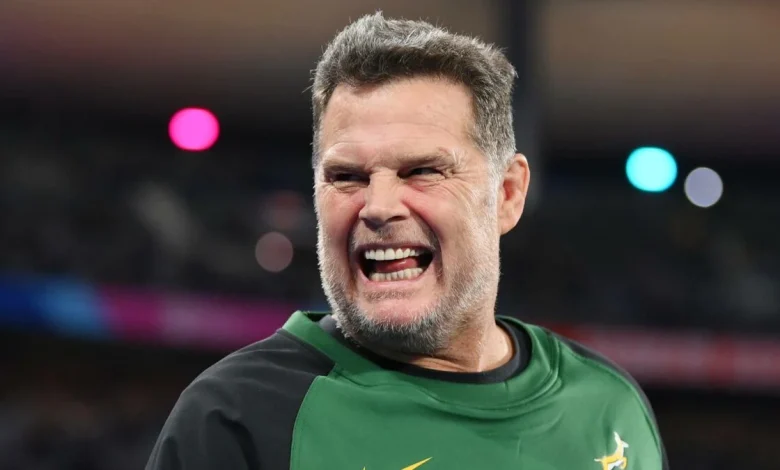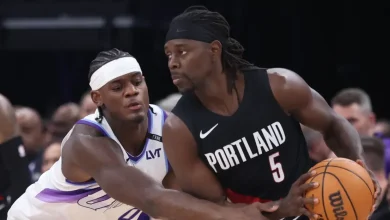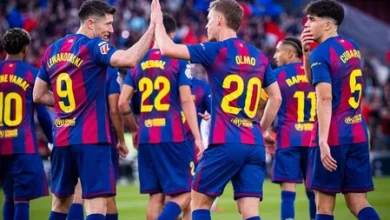World Rugby’s Coach of the Year award is a joke, and the punchline is always the same – anyone but Rassie

A
Set small text size
A
Set the default text size
A
Set large text size
World Rugby’s Coach of the Year award has become less an honour and more a pantomime, a polite comedy sketch where the punchline is always the same: anyone but Rassie.
Year after year, the committee gathers in their blazers, claps politely, and hands the trophy to whichever coach looks most diplomatic while ignoring the man who keeps rewriting the sport.
In 2023, Andy Farrell was crowned. A charming fellow, yes, but his crowning achievement was guiding Ireland to yet another quarterfinal exit. If failure at the biggest stage is now a qualification for Coach of the Year, then perhaps the award should be renamed “Best Effort in a Supporting Role.”
In 2024, Jérôme Daret of France Sevens took the prize. His tactical genius? Selecting Antoine Dupont. Before Dupont, France Sevens were a middling side with a 54% win rate. After Dupont, they soared to 72%, won the Madrid Grand Final, and Olympic gold.
In the Paris final, the score was 7–7 at halftime before Dupont came on. France then won 28–7, with Dupont scoring twice and assisting once. That’s not coaching, that’s Dupont.
If World Rugby wanted to honour a Sevens coach, Tomasi Cama of New Zealand, whose team maintained a higher than 75% win rate, had a far stronger claim. But why reward actual coaching when you can reward proximity to Dupont?
This year, the committee decided to avoid awkward questions by announcing the award in September.
John Mitchell, England’s Women team coach was crowned after winning the World Cup. But England’s dominance is structural: fully professional since 2017, with a record of 91 played, 87 won, 4 lost since 2017.
Their success predates Mitchell’s arrival by a couple of years. England were always going to win, regardless of who held the clipboard. Mitchell’s greatest achievement was showing up at the right time.
Meanwhile, Rassie Erasmus took the Springboks from 44% under Coetzee to 74% under his reign. In 2025 alone, they recorded an 83% win rate, humiliated New Zealand in their backyard, beat Italy and France away with 14 men, and won or retained every trophy they contested.
He can field two full squads of 23 that would be competitive against anyone. He pioneered the Bomb Squad, turning the bench into a tactical weapon.
He redefined versatility, turning players into Swiss Army knives: for example, van Staden covering hooker, Willemse covering almost every backline position, Kwagga Smith covering flank, No.8, and wing, Esterhuizen rotating between inside centre and flank, Grant Williams covering scrumhalf and wing equally well.
He used rotation not as an opportunity to rest and build depth but as a weapon, ensuring two world-class squads were match-sharp and tailored to exploit opponents. He invented the open-field maul, confusing defences so badly it looked like traffic wardens waving cars into oncoming buses. He built resilience so that red cards became tactical puzzles rather than match disasters.
Beyond tactics, he dismantled the toxic quota narrative, insisting transformation means opportunity, not tokenism. Siya Kolisi has spoken openly about how Rassie created an environment where black players felt heard, respected, and celebrated. Erasmus received the FW de Klerk Foundation Goodwill Award for uniting the nation through rugby.
Rassie Erasmus, Coach of South Africa interacts with Siya Kolisi of South Africa inside the South Africa dressing room following the Rugby World Cup France 2023 match between England and South Africa at Stade de France on October 21, 2023 in Paris, France. (Photo by Adam Pretty – World Rugby/World Rugby via Getty Images)
Critics brand him as a villain that: push laws too far, play boring power rugby, pressure referees via social media and someone that rely on unfair substitutions.
But his methods are within the laws, his style has delivered multiple World Cups and Championships, and his referee critiques forced accountability.
His infamous 2021 video led to a long ban but also forced World Rugby to create formal review channels. Since then, referees are reviewed more rigorously, coaches have clearer complaint channels, and officiating standards are openly debated. He didn’t break rugby. He modernised it.
And yet, the award committee prefers coaches who win politely. They hand out trophies like participation medals at a school sports day and just like these participating medals devaluing the honour. If innovation, resilience, and nation-building don’t qualify you for Coach of the Year, then perhaps the award should be renamed: “The Coach Who Offended the Fewest People this Year.”





